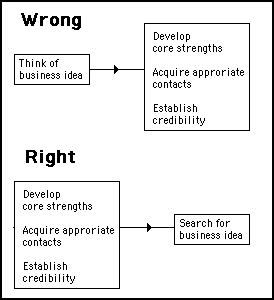
Chapter 2
At odds with the conventional world
The business idea has to emerge later
A business idea has the best chance of being brought to fruition if it is born into the right environment (where a suitable infrastructure and the necessary contacts are in place). Surely then, it would make sense to wait until these conditions are in existence before firming up or going ahead with any specific e-business idea?
The situation can be likened to a game of poker. Does it make any sense to have a plan or an idea to win a game of poker before the cards are dealt? Isn't it more sensible to wait and see what cards turn up before making any play decisions? In this way, you wouldn't be forced to play with a weak hand: you could wait for a really good set of cards to come along before making any strong bets? The play would then be determined by the emergent situation: responding to what is, rather than what might be.
This is what e-business should be about, waiting until you have developed a competitive position with a strong hand. Then, like a poker player, you make opportunistic plays according to a developing situation. In other words, setting up a position of strength before deciding what business moves to make.
With this mind set, it becomes pertinent to think about the timing of the main business idea. Should the idea come before or after a position of competitive strength has been established? This order is vitally important because it determines the whole nature of the e-business strategy.
The intuitive assumption is that the main business idea would have to come first because otherwise you wouldn't know which infrastructure to design or what appropriate contacts to make; you wouldn't know the kind of Web presence that is needed or staff to employ.
Stop to think about this for a moment. You are going to enter a fast moving, highly changeable, competitive environment. Would you have the time to set up contacts, hire and train staff, arrange associations of cooperation and collaboration, design a Web site with all the necessary backend organisation – before the idea goes out of date or the competition moves on to something better? What if the idea goes stale before the business infrastructure is fully operational? Wouldn't it mean much of the custom made preparation work is wasted, losing time and haemorrhaging capital?
If anything is predictable about the e-business environment it is the certainty of continuous change. No ideas are viable for very long. This means that if a competitive position is constructed according to the demands of a business idea, the infrastructure would have to be continuously changed and updated. This would see the business spending more time working on the infrastructure than implementing the idea.
Here is where a conventional business mind set has to make a large conceptual leap because in a volatile business environment it would be necessary to arrange for the infrastructure to be a solid, stable base and view any business ideas as transient and changeable (a nightmare scenario for a managed team with a business plan).
This is counter intuitive because it would seem that building an infrastructure before any definite business idea had been decided upon would be hopelessly inefficient. Surely, it must seem, much of the work would be wasted if you didn't know how the infrastructure was going to be used?
However, in a fast changing, competitive environment this strategy makes a lot of sense because from the position of a stable infrastructure, you can wait for an opportunity to emerge that exactly matches the facilities and skill sets at your disposal. Instead of having to have a delay between having a business idea and being able to put it into operation, it would be possible to act instantly, capitalising on an idea while it is still hot.
It would seem then that the most efficient strategy will be to create and maintain a position of competitive strength and search for suitable business ideas that can be handled from that stable base. It is for this reason that "dancing around the fire" is a necessary first step in the creation of an e-business. Core strength, credibility and appropriate contacts have to be established first. Only then, when these cards are in your hand, can you start to look for ideas or opportunities that match the cards. This situation is illustrated in figure 2.1

Figure 2.1
An e-business venture should start by establishing a core strength, acquiring contacts and establishing credibility before even contemplating a business idea. The business idea should then be selectively chosen to match these assets
By using this strategy of establishing a stable base first, it is possible to be able to act immediately and efficiently when any opportunity presents itself because you don't have to change your contacts and rebuild your infrastructure.
Naturally, the contacts, the infrastructure and the assets to hand will limit the number of opportunities that can be taken advantage of – but, these are some of the parameter that help define the boundaries of the search space when looking for e-business opportunities.